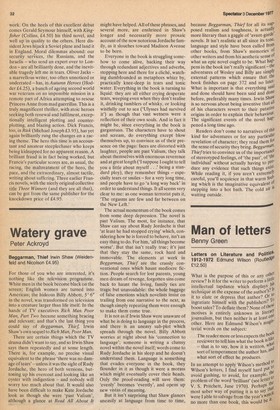Watery grave
Peter Ackroyd
Beggarman, Thief Irwin Shaw (Weidenfeld and Nicolson £4.95) For those of you who are interested, it's nothing like the television programme. White men in the book become black on the screen; English women are turned into American; the hideous Billy Abbott, 5' 6" in the novel, was transformed on television into a creature larger than life itself. In the hands' of TV executives Rich Man Poor Man, Part Two became something bracing and relevant; and that's the last thing you could say of Beggarman, Thief Irwin Shaw's own sequel to Rich Man, Poor Man.
There are certain things which the TV drama didn't want to say, and so Irwin Shaw says them repeatedly and at some length. There is, for example, no precise visual equivalent to the phrase 'there was no damage of tears' -unless it was the sight of Rudy Jordache, the hero of both versions, buttoning up his overcoat and looking like an oyster with indigestion and nobody will worry too much about that. It would also have been difficult to make Kate Jordache look as though she were 'past Valium', although a glance at Read All About it might have helped. All of these phrases, and several more, are enshrined in Shaw's longer and necessarily more prosaic account of the now notorious Jordache family, as it slouches toward Madison Avenue to be born.
Everyone in the book is struggling somehow to come alive, hacking their way through redundant adjectives and adverbs, stopping here and there for a cliche, watching dumbfounded as metaphors whizz by, practically knee-deep in tears and tonic 'water. Everything in the book is turning to liquid: they are all either crying desperate tears, weeping even when they don't realise it, drinking tumblers of whisky, or looking wistfully out to sea ('Ulysses had survived it') as though that vast wetness were a reflection of their own souls. And in fact it might be, since everything in the book is gargantuan. The characters have to shout and scream, do everything except blow themselves up, to convince, us of their presence on the page: faces are distorted with laughter, people are past Valium, they talk about themselves with enormous reverence and at great length CI suppose I ought to tell you a little about myself. .' being a standard ploy), they remember things especially tears or smiles for a very long time, and people have to go 'a long way back' in order to understand things. It all seems very clear to me: as one woman terrorist puts it, 'The orgasms are few and far between on the New Left.'
The actual momentum of the book comes from some deep depression. The novel is past Valium. The most, for instance, that Shaw can say about Rudy Jordache is that 'at least he had stopped crying' which, considering how he is forced to behave, isn't an easy thing to do. For him, 'all things become worse'. But that isn't really true; it's just that they stay the same, rock hard and immovable. The elements at work in Beggarman, Thief are the crassly conventional ones which haunt mediocre fiction. People search for lost parents, young men dream of revenge, forgotten sins come back to haunt the living, family ties are tragic but unavoidable: the whole baggage of false emotions which novelists insist on trailing from one narrative to the next, as though simply repeating them were enough to make them come true.
It is not as if Irwin Shaw were unaware of what he is doing to language in the process, and there is an uneasy sub-plot which spreads through the novel. Billy Abbott worries at night about his 'connection to language'; someone is writing a clumsy novel within the novel itself; words come to Rudy Jordache in his sleep and he doesn't understand them. Language is something that evades everyone in the book, they flounder in it as though it were a morass which might eventually cover their heads. Only the proof-reading will save them; 'evenly' becomes 4evently', and opens up new vistas of meaning.
But it isn't surprising that Shaw glances uneasily at language from time to time, because Beggarman, Thief for all its supposed realism and toughness, is actuallY more literary than a gaggle of 'avant-garde' novels. It isn't realistic at all since its tone, language and style have been culled front other books, from Shaw's memories of other writers and from his aesthetic sense of what an epic novel ought to be. What hap' pens in the book isn't really significant the adventures of Wesley and Billy are sh111)1Y external patterns which ensure that the book finishes on page 372 and no later' What is important is that everything said and done should have been said and done before, preferably many times. Irwin Shag.' is so nervous about being inventive that an Of his characters revert to their putative origins in order to explain their behaviour. The significant events of the novel bar pened a long time ago. Readers don't come to narratives of this kind for adventures or for any particular revelation of character; they read them for the sense of security they bring, Beggarrnag, Thief tries to convince us of the importance of stereotyped feelings, of 'the past', of 'the individual' without actually having to Pr°' duce any evidence that such things exis!' While reading it, if you aren't extrerne'Y careful, you'll acquiesce in that warm feel; ing which is the imaginative equivalent stepping into a hot bath. The cold air Is waiting outside.










































 Previous page
Previous page